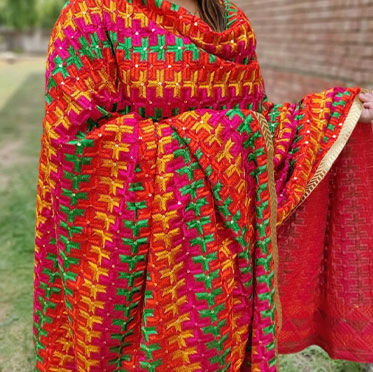






phulkari
"Kadd kasidha paihren choli, Tan tujane nari" means "Only when you can embroider your own blouse with the embroidery stitch, will you be accepted as a women” quoted by Guru Nanak Dev ji is enough to understand the value associated with the traditional art form of embroidery i.e. Phulkari.
Originated in Punjab as early as 15th century, PHULKARI means “flower". This art form consists of intricate and original flora or geometric designs and patterns, pleasing and harmonious color combinations, balanced to composition. The stitches are smooth, even and regular which is reflected at the back of the Phulkari. Only smooth and faint lines of very small dots at regular intervals will be formed on the reverse of the cloth having more than 23 patterns.
From its initial days of only gifting phulkari on the occasion of marriage and being on the edge of disappearance after partition in 1947, the commercial production of phulkari has been initiated. Now, special training institutes/schools are run by the Government and private sector for embarking phulkari related skills amongst artisans. Efforts by Government/NGOs/private sector help in promotion, revival and sale of phulkari products like bed sheets, pillow covers, purses, caps, etc. across the globe.




